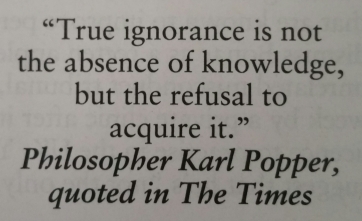
Why did I start with the above quotation? Here’s a few possible reasons:
- I believe this pithy aphorism neatly sums up the general tone of the argument that follows
- I’ve seen other writers do this and I want to copy them
- It’s by a famous thinker so appears to add credence to my viewpoint
- Traditionalists who follow my blog will love it
- It makes me sound clever (well read)
In this instance, there’s a bit of a clue that the last reason is my primary motivation. It’s a photo. Had this quotation been a central tenet of my worldview then I might well have memorised it by now and have quickly typed it up. Instead, I took a photo of a list of famous quotations from The Week magazine and thought ‘that’ll go well with my fancy terminology blog’. So sometimes peppering work with quotations from philosophers or long words is unnecessary; often it’s just showing off. There’s nothing wrong with showing off every now and then, of course: I’m a teacher – what other perks are there apart from demonstrating how clever you are on a daily basis?
The problem is that other equally clever (or cleverer) people see through this. Examiners (I know, but some of them are quite clever) tend to notice when pupils bang in posh terms without really doing anything meaningful with them. ‘Feature spotting’ is what we call it.
So, as teachers – especially as English teachers – we have to be careful with teaching complex terminology for the sake of it. And lots of English teachers on Twitter do feel that a lot of it, the Greek stuff in particular, is just showing off, flexing of intellectual muscles.
But I think that there is a place for complex terminology when it is used to illuminate, as well as impress. The reason I’m writing this is in response to AQA’s recent ‘how to teach the new English GCSE’ sessions. @xris32, in his typically astute and helpful blog on teaching structure, noted how AQA had classified ‘sentence’ as technical terminology in one of their worrying exemplars. This is a good thing, we were told by the well-meaning trainer, because it means you don’t need to teach the complex stuff for pupils to get really good marks. There’s a feww things about this that concern me: 1. I don’t believe her, 2. if ‘sentence’ is a technical term then surely anything (‘word’, ‘writing’) can be and 3. often the technical term can provide far more than a simple (simplistic?) alternative phrase. Let’s look at one of my personal favourites, anagnorosis, as an example:
[[an-ag-nawr–uh-sis]
1.
More precisely, it is when a character makes a critical discovery. A discovery or moment of realisation that will utterly shake their foundations and make them view the world – or one part of it – through a different lens.
Why should we use this then? Won’t ‘moment of realisation’ or ‘key discovery’ do just as well. There a few reasons why I think the complex term is preferable:
- It’s shorter. Not a groundbreaking reason but anything that saves time in an exam/lesson is a good thing.
- It makes the student focus on key scenes within a play/passages within prose/lines within a poem. It shifts from being a plot point to a critical structural shift. Look at Othello for example. The eponymous tragic hero doesn’t just realise that Iago is lying: he is forced to deal with the recognition that his naive, jealous nature is his fatal flaw (‘hamartia’ if you like) and that it has brought about his downfall. In other words, Shakespeare’s use of anagnorisis conveys Othello’s self-destructive character as much as Iago’s Machiavellian machinations.
- It also makes them consider the structural significance of when the anagnorosis occurs. In Romeo & Juliet the lovers’ anagnorises occurs relatively early in the play (‘My only love is my only hate’, ‘my life is my foe’s debt’) and the fascination comes in the pair’s refusal to acknowledge this paradigm shift and decision to self-destroy. In Othello it happens at the denouement. The audience’s fascination is the delicious delay in waiting to see the Othello’s reaction to Iago’s unmasking. You could argue that ‘moment of realisation’ could do the same but by making it a “language feature”, especially one with a daft name, they are more likely to remember it. The same goes for anthropomorphism, which always gets an intake of breath and a laugh when you first say it.
- It encourages pupils to look for anagnorises in other texts and hopefully consider the structural importance of that section. My Year 10s were perplexed by this ridiculously complicated – and bloody hard-to-spell word – during R&J but I was thrilled to discover them using it, and applying it well, to Hughes’s ‘Bayonet Charge’ (‘Suddenly he awoke and was running…’).
- I thought we were meant to be moving towards mastery learning? Is it fair to suddenly say to A level pupils “Right now I’m going to introduce you to the clever stuff that you couldn’t handle in Year 9”? If they’re going to need top level terminology at KS5, surely it’s better to introduce, along with the 19th century texts, at KS3 or KS4?
- It sounds clever. When used properly, it really does.
Thanks for reading,
Mark


I love your anastasia of such perspicacious and erudite lexical terms. It makes me feel a degree of epignosis I haven’t encountered for a while 🙂
LikeLike